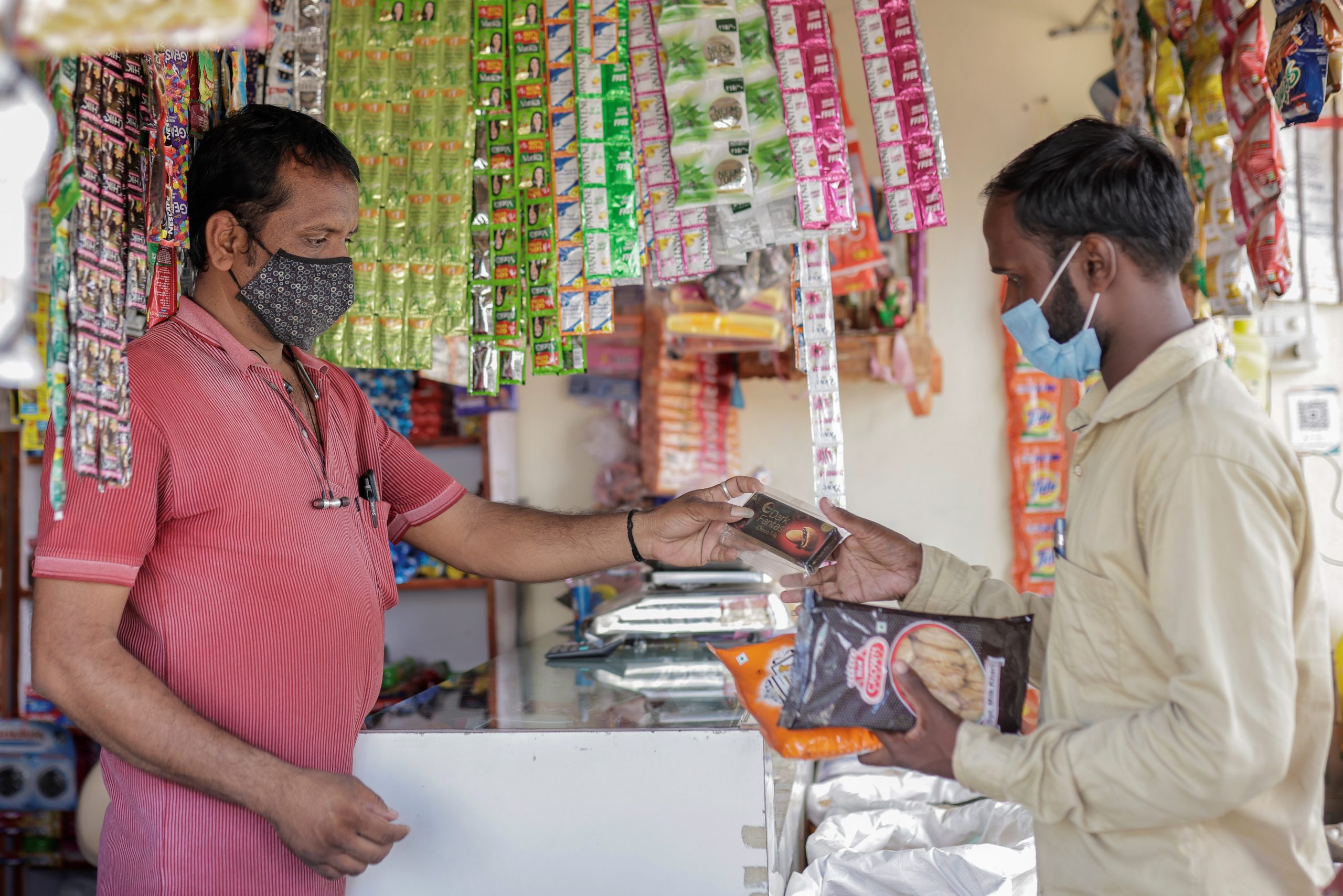Until a couple of years ago, Ramachandra Kuchekar would shut his small grocery store once a month and travel to Pune, the nearest city from his village in western India. There he’d meet wholesalers and pick up supplies to stock his shelves.
It was always a costly trip. His store is his family’s sole revenue source and shutting it on a working day meant losing a day’s worth of business.
Kuchekar was not alone. According to industry estimates, India has over 12 million grocery stores, called kirana stores in local parlance. Ten million of these are in rural areas, which are not covered by conventional distribution networks for global and local fast-moving consumer goods (FMCG). These stores rely on third-party wholesalers in bigger towns and cities for supplies.
But now a startup is improving the operations of these small businesses, one grocery store a time, with the help of cloud and artificial intelligence (AI).
“We wanted to transform the life of the village grocer,” says Sandeep Deshmukh, who founded ElasticRun in 2016, along with Shitiz Bansal and Saurabh Nigam. “The 10 million stores were left to fend on their own while buying from the wholesale market. Simultaneously, the brands also lose their visibility and control on servicing these stores.”

While it might appear complex, ElasticRun’s solution is based on a simple idea. Think of it as a food delivery app, except with FMCG companies as its customers on one end and rural grocery stores on the other.
“Five years ago, we realized that the gig economy could also transform the logistics business in the country. All we needed was to aggregate resources like vehicles, real estate, and people, and make it accessible to people through a digital platform,” adds Deshmukh.



ElasticRun’s platform connects the dots.
It gives grocers the option to order consumer goods from the comfort of their stores, just like their urban counterparts.
Grocers can download the company’s app, choose the products they need, make the payment through the platform’s gateway, and just wait for the products to get delivered to them.
Once a grocery store owner places an order, it hits the nearest ElasticRun “station” or a warehouse, where it is packed and kept ready for pickup.
These stations are strategically placed across the country to minimize cost and time incurred in sending them to their destination.
But then comes the difficult part of shipping the order from the warehouse to the store–the Achilles’ Heel of traditional distribution networks.
ElasticRun utilizes the shortcoming every transport network suffers from—the curse of fixed capacity.
Which is to say that at any time the transporter is either losing money because the assets are under-utilized or losing business because they don’t have enough capacity to service the entire demand.
ElasticRun’s platform enables these transport companies to put their idle or under-utilized vehicles on its network to do runs between warehouses and grocery stores.
So if they have a vehicle that’s fully or partially empty, they can use that available capacity to deliver groceries and make additional money on the same trip.
Today ElasticRun works with over 100 brands and has nearly 200,000 stores across 19,000 villages on its platform. The plan is to grow that network to two million stores across over 150,000 villages by next year.
The trio began their journey determined to build a cloud solution that that would empower small businesses securely and at scale. It wasn’t long before they decided to build their platform on Microsoft Azure.
“As we scale into multiple geographies, we expect our technology to scale too. We chose Azure Kubernetes Services because it provides a highly scalable cloud-native architecture for our platforms. One big advantage is that the system can easily scale up during peak seasons and festivals, such as Diwali, when the orders are more, and scale down during non-peak times,” says Shitiz Bansal, ElasticRun’s co-founder and CTO.
ElasticRun’s secret sauce, Bansal adds, is the control tower running on Azure that uses AI and machine learning to automate the logistics business. Think of it as an equivalent of an air traffic controller for on-ground logistics that aggregates all aspects of the business—the grocery stores it services, the on-ground agents, the warehouses, and the delivery network of transporters.
The platform also uses Azure Functions to chart out better delivery routes that can maximize the number of shops that can be serviced in a day.
“Our delivery partners can upload their plan for the day. These are sent to Azure Functions, which calculates the plan and runs algorithms to arrive at the most suitable delivery routes,” he explains.
Interestingly, the platform is smart enough to warn drivers to avoid routes that have higher instances of thefts—a common occurrence as they ply between vast distances in the middle of nowhere.
“The control tower monitors our network, looks for any potential defects, and alerts the right programs or team members. It’s also a self-healing platform meaning that it ensures no error is repeated and the company continuously improves the quality of its deliverables across the network,” Bansal adds.

ElasticRun’s network became invaluable when COVID-19 emptied supermarkets, broke supply chains, and made it impossible for people to step out of their homes.
“April and May last year were probably the toughest months of the business. The demand was very high, but the supplies limited,” Deshmukh recollects.
ElasticRun worked with local authorities to deliver essential goods to remote areas.
“It wasn’t just an advantage for the store owners because they didn’t have to travel; it was that they couldn’t,” Deshmukh says. “If we were not there, their supply lines would have been broken.”
In the coming months, ElasticRun plans to extend its transportation network to other industries such as pharma, food, and general merchandizing. The company also plans to leverage the data it possesses to introduce credit services to all its users.
“Since we already know the financial footprints of the stores on our platform, we’re working with banks that can use this data and extend loans to stores whose finance footprints they like,” Deshmukh explains.
The company also plans to use that data, which maps the consumption patterns of all its stores in different parts of the country to provide insights to its FMCG customers.
“We have the ability to come up with an analytics product that will project the consumption patterns of the country, which would be useful for marketeers,” Deshmukh says.
In just five years, ElasticRun has come a long way: from leveraging the gig economy and beating the pandemic supply shortage to using data to offer a wide range of services to its users.
But they’re just getting started on their quest to transform the lives of ten million grocery store owners and the communities they serve.
Abhishek Mande Bhot is an independent writer and editor covering news, lifestyle, and luxury for publications in India and the US.


